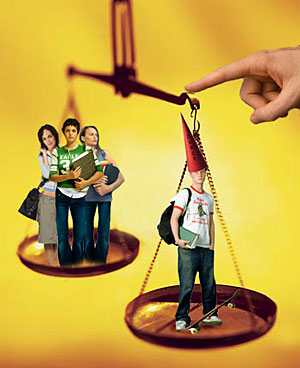
Note for the image: the execution of the Gunpowder Plotters, 1606.
A legal scholar says that "eye for an eye" justice is a lot more humane than you think.
Feb. 20, 2006 | When William Ian Miller, professor of law at the University of Michigan Law School, came to the phone to talk about his new book, "Eye for an Eye," he was, he confessed, "wired." "I've been talking to my students about the Icelandic sagas!" he said. Miller -- known in literary circles for such provocative, unclassifiable books as "The Anatomy of Disgust" and Salon favorite "The Mystery of Courage" -- cut his scholarly teeth on the sagas, and he thinks we modern types don't give the harsh but heroic societies that produced them enough respect. "Eye for an Eye" describes how justice worked in Medieval Iceland and England, and in the biblical world that formulated the most familiar version of the law of the "talion." It's defined by the American Heritage Dictionary as "a punishment identical to the offense."
"Eye for an Eye" offers a closer look at "talionic" societies -- also known as honor- or revenge-based cultures. It features such strange artifacts as a price list from 7th century England dictating in great detail the number of shillings owed to a person suffering various injuries, from a broken arm to a lost toenail. (Did you know that the little finger was worth more than the index finger? As Miller, who mangled his own pinkie while playing with his son, found out, it's more crucial to maintaining a firm grip.) Or, rather, the compensation laws of King Aethelberht might seem bizarre until you realize that contemporary insurance companies probably have the same sort of lists. And contrary to what we tell ourselves, honor-based societies, Miller argues, often placed a higher value on human lives and human bodies than we do.
Miller insists that underneath our sophisticated modern rationalizations, we still harbor talionic beliefs that make us uneasy when wrongdoers don't pay for their crimes in exact proportion to the harm they cause. That's why, he says, we like stories about characters who even up the score with their enemies -- not just vigilante action films, but comedies in which, say, the bullied nerd triumphs in the end. That's why we're fascinated by revenge.
Your book argues that we often use the term "eye for an eye" to describe a harsh kind of justice from the past. But talionic societies could be said to put a higher value on human life and the human body than we do. They were much more committed to finding the exact worth of body parts and lives. So, let's say you poke out my eye...
Then, instantly, my eye becomes yours. To get the value exactly right, we say an eye is worth an eye. You have a right to my eye. Now you can say to me, "I'm going to take your eye." Then I'm going to say, "Hey, what would you be willing to accept instead?" It becomes an initial bargaining position.
If you want victims to be more highly valued and you want real, adequate compensation, this is how to do it. Now if I offer you what some lousy insurance company says your eye is worth -- say, $100,000 -- you'll say, "No way! I would never have let you take my eye for that." Instead, you can be sure I'll put the same value on not losing my eye that you would have put on yours, and I will pay you that amount to keep my own eye. How about $5 million? Let's start there. And we'll bargain it out.
Of course there was no insurance in those societies. We like to think that life was cheap in those cultures, but the problem was that it was so expensive they couldn't get anything done. Life is cheap with us, despite all our talk about how we can't have capital punishment because human life is too valuable. Do you know there are these signs up on the Michigan highways that say, "Kill a worker, pay $7,500"?
Is that supposed to warn you to be careful not to hit a highway worker with your car?
Yes, because not only are you going to go to prison, but you'll pay a little fine. But everyone who drives by and reads it sees it as an insult. Seventy-five hundred for a highway worker! "Hey, I've got $7,500, let's knock one off!"
When people compare modern ideas of justice with the old idea of "eye for an eye," they often talk about the difference between justice and revenge.
There is no difference. The literature on punishment and retribution, the philosophical and legal literature, doesn't understand revenge. They talk about revenge as going postal, the lawless, crazed overvaluation of your own harm. But if you look at real honor cultures and real revenge cultures, they were measurers and proportionalists to the extreme. What they would call revenge is simply paying back exactly what was owed. No more, no less.
The law of the talion was not a law issued by a government to regulate criminal matters. It was tort law, a compensation principle dictating how much private party A owes private party B for the harm A did to B.
The rule of "eye for an eye" originated before there were ready money substances. There were things that worked as money, like grain and cows, but I argue that the dominate money substance in most settings was humans themselves, or parts of humans. You see human beings used as one type of money, as a way of providing a measure of value. You paid in humans, or you paid yourself over to secure a debt.
You mean your labor?
Your labor, but also your whole body. You enter into the household of the person you owe and work it off.
You list several instances where bodies or even parts of bodies were used as payment, literally or metaphorically.
Well, what is the Eucharist, for heaven's sake? It's a payoff on a hundred levels. It's paying off God, because God is vengeful. The incarnation and crucifixion and sacrifice of Christ is the law of the talion. You owe a god to a god for a breach of god's rights.
Not only that, but God has to divide himself into more than one person in order to pay himself off. But it's paid on behalf of mankind, who could never pay back what's really owed.
It can't be God just paying God. Christ is also the perfect man, a man who is God and then pays God. So the balance is exactly right, an eye for an eye. Otherwise, God is undercompensated.
But the original "eye" in this case is the disobedience of eating the apple in the garden, and the life of a god seems like a high price to pay for that.
Well, God was never what we would call a proportionalist. God goes postal a lot, which is what human societies won't let their people do.
So, in a way, the Old Testament God is exactly the kind of vengeful berserker that modern justice systems promise to protect us from.
You raise a good point. In an honor society, when you have a young man, a hot-tempered person who's been wronged, he wants to go machine-gun everybody on the other side. But he's not alone. He's got a kin group and elders who restrain him. They say, "No, no, no, don't do that because we're going to get hit back if you go over the line. You make a measured response. You can't do nothing, but you have to hit in proportion to the harm done to you, otherwise we're going to be whacked back really badly." This guy has equals or superiors to keep him in line. But who does God consult with? He loses his temper and he's got nobody around to restrain him.
Also, he never has to pay the consequences.
He doesn't. He's immune. But the Bible has some wonderful stuff in this regard. Certain people like Moses or Abraham try to counsel God to calm down. Abraham says, "God, will you really take out Sodom and Gomorrah if I can find 40 righteous people?" And then God says, "OK, I'll spare it for 40." And then Abraham says, "What about 30?" That's a little shtetl bargaining there. God says to Moses, "I've had it with you guys. What did I take you out of Egypt for? I'm going to whack you." And Moses says, "You can't do that because the Egyptians will make fun of you for not being able to bring your people to where you said you were going to bring them." So actually, in the Bible you do sometimes see God getting the kind of counsel that any crazed young man would get from his own brothers or the elders in his community. And when he doesn't get that counsel, he goes bonkers.
That's how it works. In some revenge cultures, you don't necessarily have to hit the person who did the wrong. You could hit the brother of that person, or his son. Sometimes the person who whacked your brother is not an equivalent person to your brother. If you kill him, you're devaluing your brother. Suppose the killer has a wonderful, very talented, beloved brother -- well, then you kill him.
Which is hard luck for the brother!
But before we start laughing at that, consider what that means. If you know that those are the rules in your society -- that you, the cool guy, can die for the harm that your loser brother or cousin causes, you will control your loser brother or cousin. It makes for peacekeeping.
The group controls its own loser members. And here's how they do it: They whisper to the other side, "Take him out. He's free." You see this in Mafia movies sometimes. Or sometimes they'll ax their own guys. The Eskimos will kill their own guy, if he's causing too much trouble. Other societies tend to sell 'em out.
One objection to capital punishment is that it is a kind of revenge. The state has taken over the punishment of the culprit on behalf of the entire population, and it should refrain from becoming merely the instrument of an individual victim's rage or blood lust.
But why assume that what motivates the victim (or the victim's survivors) is anger, rage and fury? Couldn't they also be motivated by a sense of grief or duty or love? Perhaps they're desperate to set things right for their loved one. Perhaps they're not motivated by rage but by a grim sense of purpose, or a keen sense of obligation. We demean the wide emotional range of what an avenger might feel. Often in a talionic society what an avenger would feel is fear because he's got to go do this duty against someone who's already proven himself a killer.
When God says, "Vengeance is mine saith the Lord," he's taking a right that the people had and saying, "I'll do it on your behalf." Today, the state says to a victim, "We are taking away what, in prior times, was your right to settle this account and we will settle it on your behalf." Supposedly, we do this for the benefit of the entire society. But if that price is less than what the victim would have gotten in the earlier system, isn't the victim being asked to pay for a wider societal benefit? Doesn't something more need to be done for the person who's been wronged?
People like to dismiss these victim's rights groups as a bunch of crazed, vengeful, red state lunatics. I think they could be on to some deep moral sense that the wronged party has been undervalued in our fastidious concern not to undervalue the dignity of the wrongdoer. I think we may be in a zero-sum game here. Any anxious dignity you might confer on the wrongdoer is subtracted from the victim. Unless you find a way of making that up, victims and their kin will feel forgotten or undervalued. They're not getting the price right.
Honor cultures were really good at that. The earliest laws, most people don't realize, were not in the form of "Thou shalt not" but in the form of "For X pay Y." They're about setting prices and determining equivalences. That is what "eye for an eye" is all about.
So when we think of "eye for an eye" as a bloodthirsty, out-of-control response, we're misinterpreting it?
Totally misinterpreting it. It's about setting the price that constitutes exactly fair compensation for the loss. You can't take more than an eye, but you can't take less either, or you're a coward. The Hebrew word "shalom" is the perfect illustration of this, along with the shared root of the words "pay" and "peace" in the Indo-European languages. "Shalom" means to pay, to make whole, a term that could be equally substituted for "revenge." It means to make whole again, to be paid back in kind, and it's still the modern Hebrew word for "pay." It's also the word for "peace." Why? Because once you've been adequately compensated, once the balance is even, there can be peace.
This reminds me of the controversy around divvying up the compensation money for family members of those who died on Sept. 11. People who were the survivors of a working-class person resented the idea that they might get less than the family of the stockbroker.
Some weenie of a stockbroker would be valued higher than the fireman who went in to save him! Of course, this created a furor, and rightly so. In our utilitarian, highly sophisticated society, we don't think as clearly as the people in my old cultures. They were much better at evaluating things that we think can't be captured in dollars. They knew what a man was worth. Why? Because they measured his honor. They would have no doubt that a fireman who went into a burning building was a man. He had to be compensated for his moral character and not just his earning stream. That would figure into it, but honor was a complex concept. It allowed all the things that we think really matter to be put on the scale. How courageous you were, how cool you were, how smart you were, how decent a person you were -- all that would have a price put on it.
I have to interject here that they didn't value everything that we think really matters because plenty of the people who died on Sept. 11 -- especially women, but perhaps also busboys and janitors -- didn't count for much in those societies.
That's true, and I don't try to deny that honor cultures weren't very good at treating people well who they considered dishonorable or lacking the capacity for honor. They're very good at getting adequate prices for people who are in the honor game.
All the same, we talk a good talk, but I think they actually managed to maintain a rough equality better than we do. One reason is that they were so poor. Even the rich guys in these societies didn't live that much better than the poorest guy.
Hey, I'm not saying I want to go back there. I'm just saying that they thought very hard and coolly because the stakes were so high. We think very lazily and sloppily about the same issues, like dignity and the valuation of a human life. We sentimentalize this stuff. They couldn't afford to do that.
But all this is so rational, when there is often such an overpowering emotional drive for revenge.
That's the part I call "satisfaction." There are different views about revenge through history. Homer and Aristotle say revenge is sweet. Some of these societies think you should hit back right away. Others think you should draw it out. One of the advantages of having it be your turn to move in some kind of hostile relationship is to terrorize your enemy by them not knowing when you're going to hit them. It turns out that Hamlet's most effective move with his uncle Claudius was that he could not get himself to take revenge. And it was precisely his inability to get his act together that drove Claudius to distraction.
Then there's the attitude that you see in the Mandy Patinkin character in "The Princess Bride," who says, "I've been seeking vengeance so long, now that I've taken it, what am I going to do?" There's this sense that, like sex, there's a post-coital tristesse. It's the chase and not the fulfillment that's exciting.
Still other cultures regard revenge as a grim duty. It's an ugly business all around but you've just got to do it.
You've got to demonstrate that no one can get away with harming you.
Right, because we're talking about weak states or stateless societies. If you're so weak that no one will fear you hitting back, then you and your children will simply be enslaved. But you don't want to overdo it. The saga literature is so smart about this. It says that if you avenge every little wrong done you, you have a very short life. Vengeance taking is dangerous business. What you have to do is take it just enough that the other side would have to worry about you taking it the next time. But you couldn't never take it, or you'd be a person of no consequence and people would just ride roughshod over you.
So the judgment of when to take it and how much to take...
Is a key political and moral value. The smart players are the ones who knew how to minimize their risk in vengeance taking.
And maximize their return in intimidating their enemies. There are still some parts of our society that work that way -- criminal groups or prisoners.
And in the workplace! Hell, you and your buddies, you might not kill each other, but you sure do gossip, sure do get even with people who slight you. These honor systems are still with us, which is why we understand them so well. It's not kill or be killed, but it's "You dis me? Well, you better believe I'll make you pay for that."
I recently asked a classroom of my students, "Who in this room has someone in their life that they would call their enemy?" Out of a class of 90 people, three people raised their hands. So then I said, "How many of you have friends?" and everybody raised their hands. I asked them, "Do you think friendship can mean as much in a culture where there are no enemies?" A kid from India said, "I do not understand you Americans. There can be no friendship if you have no enemies." That's a zero-cost friendship, right?
I guess so, but only if you define a friend as someone who'll help you fight your enemy.
Do you actually have anyone in your social network who you'd call an enemy?
Only if you include people who would, say, bad-mouth me but wouldn't necessarily go out of their way to harm me materially.
But would you experience no small amount of schaudenfreude if something bad happened to them?
Oh, without a doubt!
But you might not go so far as to be the cause or be involved in causing those things?
If the worst someone is doing is bad-mouthing you, sometimes the smartest move is to ignore them.
You're like St. Paul. He says, "If thine enemy hunger, feed him; if he thirst, give him drink." But here's the thing, he says that doing this is like pouring hot coals on your enemy's head! He's not saying you should forget it. He's saying that forgiveness is just a hostile move in this enmity game. It's frustrating your enemy to death! It's saying, "You can't touch me. You're so contemptible that you can't even harm me."
That's about right.
These moves that people want to argue are anti-revenge moves, like forgiveness, are just moves! Forgiveness itself is a hostile move that says, "You don't matter enough for me to go whack you."
link to the original posting











